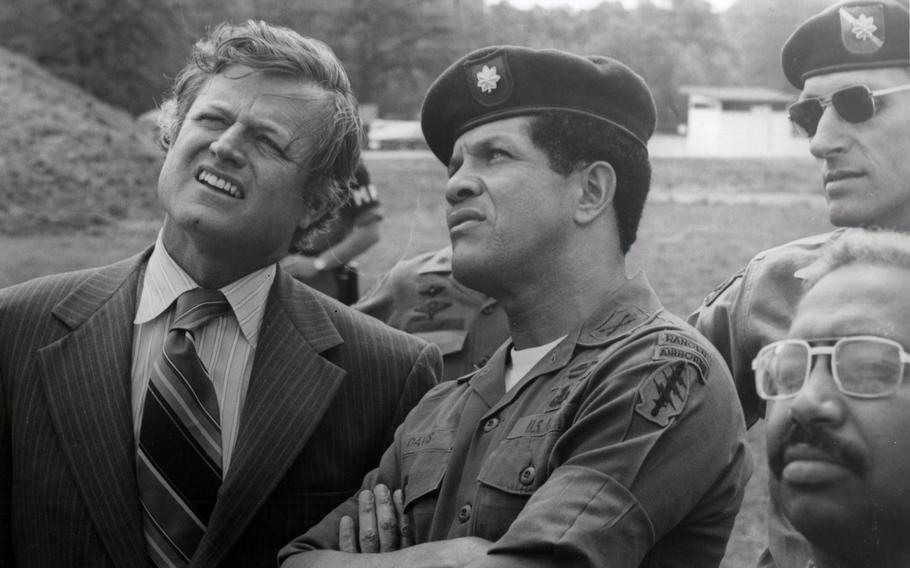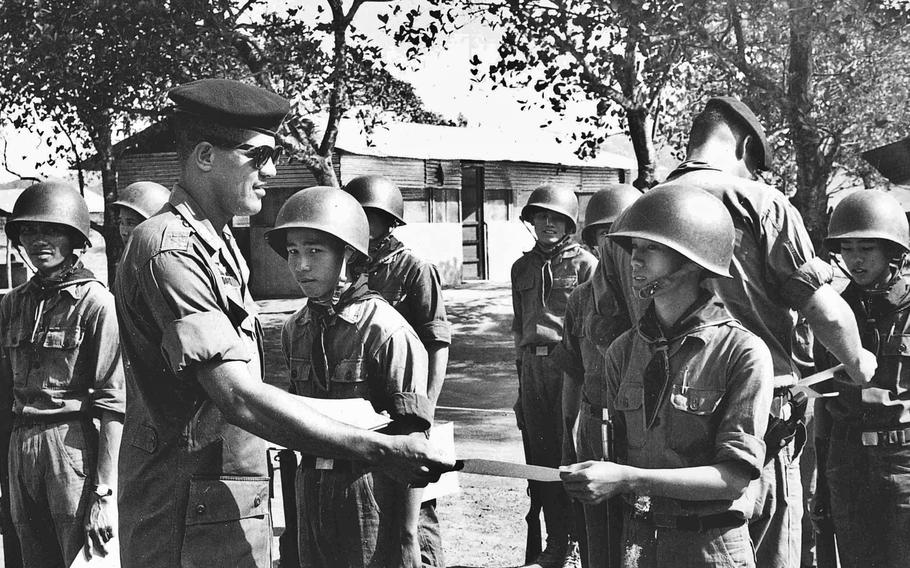WASHINGTON — Retired Army Col. Paris Davis is not comfortable being labeled a hero, though he repeatedly risked his life in the face of maximum danger on the southeastern coast of Vietnam in June 1965.
Now 58 years since his acts of heroism on the battlefield, the former Green Beret and Army Ranger is getting the U.S. military’s highest honor for his exemplary leadership and selflessness.
“I am really, extremely elated about being an American,” Davis, 83, said Thursday, a day before he is scheduled to be presented with the Medal of Honor by President Joe Biden at the White House.
Retired Army Col. Paris Davis tells of his combat actions during the Vietnam War while attending a media event in Arlington, Va., on Thursday, March 2, 2023, one day before he was scheduled to receive the Medal of Honor at a White House ceremony. (Carlos Bongioanni/Stars and Stripes)
In 1965, Davis was a captain and a commander with the 5th Special Forces Group. His unit took part in an assault on the North Vietnamese camp at Bong Son in the Binh Dinh province. Leading a group of soldiers in the attack on June 17, Davis and his unit encountered fierce enemy gunfire from a large North Vietnamese unit that pinned some of the U.S. troops down. Within moments after a sudden enemy attack, Davis found himself charging straight into North Vietnamese gunfire to help his company maneuver and target enemy positions. During the fight, he engaged in hand-to-hand combat with enemy fighters.
The passage of almost 60 years has done nothing to dim his memories of that day, Davis said.
“Blood was everywhere,” he said. “You could smell the sweetness of blood.”
The heavy gunfire and artillery from North Vietnamese forces was intense and wounded many soldiers in the company, including Davis, who received several wounds during the battle. He was shot twice as he defended other troops and struck by fragments from an enemy grenade. But his wounds didn’t persuade Davis to give up the fight.
“What you’re trying to do is stay conscious, stay mission-oriented and help where you could,” Davis said. “It wasn’t one of those things when you think, ‘I’m bleeding.’ It’s one of those things when you say, ‘I can still move.’”

Sen. Ted Kennedy, D-Mass., had a discussion with then-Maj. Paris Davis during a visit to Vietnam in late 1960s. (Photo provided by the Davis Family)
By the end of the battle, Davis had repeatedly risked his life to rescue wounded American troops and get them to a medical helicopter, and refused treatment for his own wounds until all his men were out of harm’s way.
Davis mentioned Thursday that doctors had removed the last of the grenade fragments from his body only a few days ago.
“They pulled the last piece of shrapnel out of my kidney," he said.
During the chaos of the battle, a ranking officer had demanded Davis withdraw from the area – an order Davis refused so he could rescue his men.
“He refused to leave the battlefield,” said Ron Deis, a Special Forces soldier who was in the Bong Son area that day.
Deis, who helped coordinate air and artillery support, said he remembers someone on the battlefield that day was already talking about a Medal of Honor for Davis’ gallantry under fire.
Davis was first recommended for the Medal of Honor in the 1960s. That nomination package, which includes all kinds of information so the Pentagon can confirm the recipient is worthy, was eventually lost. A second nomination package years later also failed, having also gotten lost in military bureaucracy.

Then-Capt. Paris Davis congratulates a soldier assigned to the 883rd Regional Forces for completing training in Vietnam in 1965. (Ron Deis)
“I think that’s unacceptable,” Deis said. “No nomination should ever be not resolved.”
“This was long overdue,” said Army Command Sgt. Michael Weimer, a senior enlisted leader with Special Operations Command at Fort Bragg, N.C. “But holy cow, Col. Davis deserves this one. He’s just unbelievable.”
Some have speculated Davis’ first two recommendations were possibly sidetracked due to the difficult social and political divides of the 1960s. Davis, one of the first Black soldiers to enter the Special Forces, was an American hero during a time of great racial strife in the United States.
“I don’t think anyone will know for certain what happened back then,” said Regan Hopper, Davis’ daughter. “But he was nominated twice and it was lost twice.”
She said heroes are important in the African-American community.
“We love having heroes to look up to — to help bring us the hope when we feel hopeless. He is that kind of man, and I am just so grateful now that his story is being told,” Hopper said of her father.
Davis and his family were notified last month that Defense Secretary Lloyd Austin had formally signed off on the Medal of Honor and they received a personal call from Biden.
“[Davis and Biden] talked milestones that they had in common. And Dad was just stoic and calm and just said, ‘Thank you’ about 50 times,” Hopper said. “The president was so gracious.”
Davis, who left military service in 1985, will speak with Biden once again on Friday when they’re both at the White House for the Medal of Honor ceremony.
Davis began his military service as a Reserve officer in 1959. He received airborne and Ranger qualifications in 1960 and Special Forces qualification in 1962. He served overseas tours in Vietnam and Korea and over his career received the Silver Star, Bronze Star with “V” device, a Purple Heart with one Bronze Oak Leaf Cluster and the Air Medal with “V” device. Following his service, he was the publisher of a small newspaper in Virginia, where he still lives today. He was inducted into the Ranger Hall of Fame in 2019.
“Inspiring and valor” were the words that Army Maj. Gen. Patrick Roberson, deputy commander of the Army’s Special Operations Command, used to describe Davis.
Weimer used “selfless and humble.”
Just don’t call him a hero, Hopper said.
“He doesn’t like to be called a hero. He likes the title of soldier,” she said. “He wears that with pride.”